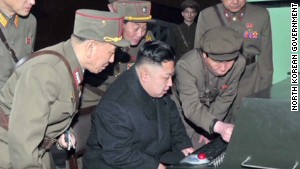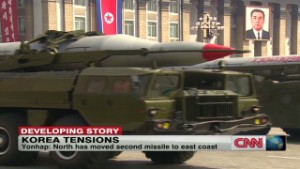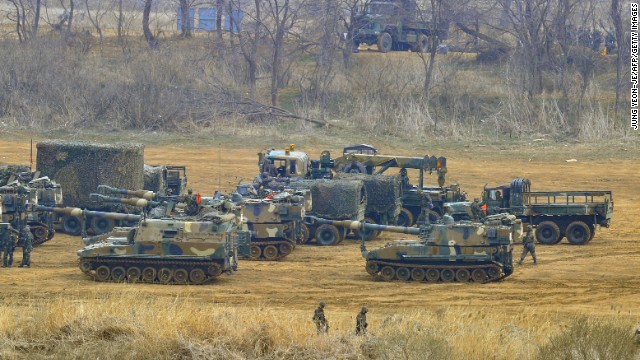An accident, then war with North Korea?
April 6, 2013 -- Updated 1453 GMT (2253 HKT)

Wesley Clark
Editor's note: Wesley K. Clark, a retired Army general and NATO's former supreme allied commander in Europe, is a senior fellow at the Burkle Center for International Relations
at the University of California, Los Angeles. Clark consults and
advises companies in the satellite communications, biotechnology and
energy fields, some with government and Department of Defense contracts.
- (CNN) -- What if war is triggered by accident or some kind of miscalculation on the Korean peninsula?
This is a possibility
that has provoked worry, analysis and preparations for more than 50
years. The recent bellicose rhetoric from the young, unproven leader of
North Korea raises this possibility to a new height. What precisely is
the risk, and what should be done about it?
The angry rhetoric of Kim
Jong Un has set a record for extremism. And yet, going all the way back
to the negotiating tactics used in the Korean War, the North has used
an extreme, abusive and contradictory style.
'
Anything conceded to them
was taken, but they conceded nothing. Anything up for negotiation was
met with ever heightening demands. Every offer of compromise was met
with an angry rhetoric of denial. Repeated rounds or negotiations over
the succeeding decades have seen little change. And their public
rhetoric has always been harsh and hyperbolic.
'
But it hasn't been only
rhetoric over the years. In the 1960s, U.S. soldiers serving in Korea
were authorized to wear their division's insignia on the right shoulder,
the so-called combat patch. A U.S. Navy ship was attacked, boarded and
seized with its crew held captive in 1968. A U.S. Army major and another
soldier were beaten to death in the Korean Demilitarized Zone in 1976.
'
Again and again, North
Korea has defied international accords, laws and common sense, creating
and exporting long-range missiles, building nuclear capabilities and
engaging in kidnappings, sabotage and cyberattack.
But there has been no war.
'
We attribute this to
three factors. First, we believe the overwhelming power of the United
States guarantees that any North Korean attack would, eventually, result
in the utter destruction of the regime. Second, the South Korean
leadership has shown remarkable restraint in the face of humiliating
North Korean provocations. Third, the North Koreans may not have ever
intended to attack, though we have no way of knowing, or they understand
that the combined U.S.-South Korean forces would destroy North Korea
should war begin.
The U.S. and South Korean deterrent remains strong -- in both rhetoric and deployable, effective military power.
'
But what about miscalculation?

Life in North Korea

Korea tensions ramp up
Yes, it is always
possible that Kim may doubt that the United States would act, despite
all the evidence to the contrary. Or, perhaps he miscalculates how far
he can push the South Koreans. It is possible that a North provocation
could be so extreme that the South would be compelled by its own
domestic politics to respond militarily -- say a tit-for-tat
ship-sinking. Or maybe such an incident occurs by accident, if
overzealous commanders make a wrong move.
'
And then Kim, fearing
that his own associates would mistake forbearance for weakness, would
escalate in turn, thus initiating a cycle of intensifying moves that
could spread conflict and turn into a war that neither side could back
away from.
The risk is higher now
than before because Kim's bellicose rhetoric may mask real weaknesses in
his authority or in his understanding.
The rising rhetoric
raises tensions (as it is probably designed to do). These tensions
increase the risks of fear or pride, which could lead to an inadvertent
incident. Should an incident occur, there will be pressure on leaders of
both sides to retaliate and even escalate hostility. The consequences
of conflict are higher than before, given the North's nuclear and
missile capabilities.
What should be done?
First, ensure that the
U.S. deterrent is capable and credible. This requires that we have the
capability to both defend ourselves and strike back, and that we make it
as clear as possible to the North Koreans our resolve to use these
capabilities if challenged.
Second, assure our South Korean allies that we will stand with them, so they can afford politically to be restrained.
Third, strike a balance
between demonstrating resolve in public and, simultaneously, working to
reduce tensions. North Korea must always be given an "out" from the box
of escalating threats it has constructed, but the out must not involve
U.S.-South Korean concessions, apologies or any signs of hesitancy,
weakness or lack of resolve. This requires artful balancing of military
demonstrations, deployments, statements and behind-the-scenes dialogue
with China and others in the region.
The odds are that there
will be no conflict. Good odds. The U.S. and South Korean leadership is
experienced. And so are those behind the young leader in the North. This
is a familiar game, but one whose risks far outweigh any actual
benefits to the North.
Follow us on Twitter: @CNNOpinion.
Join us at Facebook/CNNOpinion.


1 comment:
I like [url=http://www.nikeshop.ca/]Nike[/url] and http://www.nikeshop.ca/7pwfalaz
Post a Comment